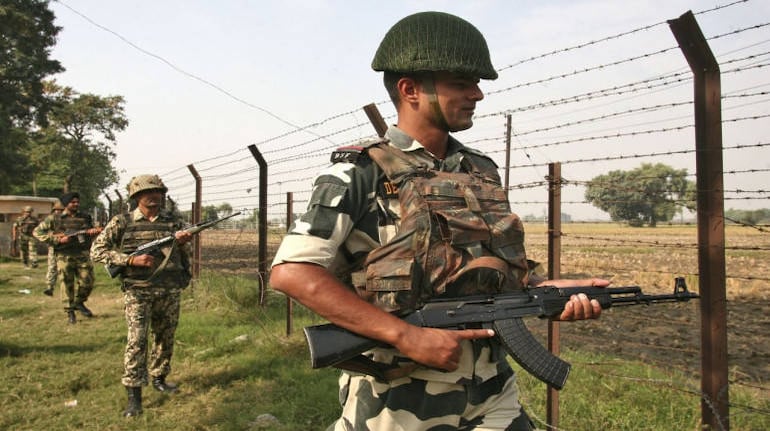



The Union Home Ministry has expanded the powers of the Border Security Force (BSF) to “arrest, search and seize” to within 50 km from the international boundary in Assam, West Bengal and Punjab. It has also reduced the area covered by the force in Gujarat.
Earlier, the BSF’s limit to operate was fixed up to 80 km from the international border in Gujarat and 15 km in Punjab, West Bengal, and Assam.
The operational powers of the Central armed police force will also apply to the Union Territories of Jammu and Kashmir and Ladakh carved out after the abrogation of Article 370 in the erstwhile State of Jammu and Kashmir in 2019.
READ: Civilians are soft targets, extremely hard to defend: Lt. Gen. (Retd.) Hooda on Kashmir killings
In the notification published in the Gazette of India on October 11, the ministry said it was amending the 2014 notification on the BSF’s jurisdiction in the exercise of the powers conferred by sub-section (1) of section 139 of the Border Security Force Act, 1968 (47 of 1968), in States where it guards the international border.
The notification has modified the ‘Schedule’ of the border areas where the BSF will have the powers of search, seizure, and arrest under laws such as the Passport Act, NDPS Act, and Customs Act.
The notification said that the following schedule would be substituted for the earlier schedule indicating the area covered by the BSF: “The whole of the area comprised in the States of Manipur, Mizoram, Tripura, Nagaland and Meghalaya and Union Territories of Jammu and Kashmir and Ladakh and so much of the area comprised within a belt of 50 kilometers in the States of Gujarat, Rajasthan, Punjab, West Bengal and Assam, running along the borders of India.”
The 2014 notification said the BSF’s jurisdiction was for the “whole of the area comprised” in Manipur, Mizoram, Tripura, Nagaland and Meghalaya and “so much of the area comprised within a belt of 80 kilometres” in Gujarat, 50 kilometers in Rajasthan and 15 kilometers in Punjab, West Bengal and Assam, along the borders of India.
The decision has triggered strong reactions from Opposition-ruled Punjab and West Bengal. Punjab Chief Minister Charanjit Singh Channi condemned the decision.
I strongly condemn the GoI's unilateral decision to give additional powers to BSF within 50 KM belt running along the international borders, which is a direct attack on the federalism. I urge the Union Home Minister @AmitShah to immediately rollback this irrational decision.— Charanjit S Channi (@CHARANJITCHANNI) October 13, 2021
Punjab Deputy Chief Minister Sukhjinder Singh Randhawa said there were no justifiable reasons for unilaterally changing the existing arrangements by the Centre, except to weaken the state government.
“By conferring powers of police officers upon BSF officers without consulting the State government or obtaining their concurrence, the Centre is attempting to distort the federal structure of the Constitution,” he said.
The Shiromani Akali Dal (SAD), a former ally of the Bharatiya Janata Party (BJP), also termed the decision as “the imposition of President’s rule through the back door in nearly half of Punjab.”
“This virtually turns the State into a de facto Union Territory. This devious attempt to place the State directly under the Central rule must and will be opposed,” senior Akali leader and former minister Daljit Singh Cheema was quoted as saying in a report in the Hindu.
MHA Notification enhancing operational mandate of BSF,15 to 50 KM’s in Punjab,West Bengal &Assam transgresses upon Constitutional Public order & Policing remit of States Half of Punjab will now fall under BSF jurisdiction @CHARANJITCHANNI must oppose it https://t.co/Yy3pOnbFGN — Manish Tewari (@ManishTewari) October 13, 2021
In West Bengal, Trinamool Congress leader and minister in the Mamata Banerjee cabinet Firhad Hakim said the Union government was trying to interfere in State matters through central agencies by issuing such orders
“The Central Government is violating the federal structure of the country. Law and order is a State subject but the Central Government is trying to interfere through central agencies,” Hakim was quoted as saying in the Indian Express.
The Centre’s decision, however, received support from former Punjab chief minister Captain Amarinder Singh who said the enhanced powers to BSF will only make us stronger.
‘Our soldiers are being killed in Kashmir. We’re seeing more & more weapons & drugs being pushed by Pak-backed terrorists into Punjab. BSF’s enhanced presence & powers will only make us stronger. Let’s not drag central armed forces into politics’: capt_amarinder 1/2 (File pic) pic.twitter.com/nu4DhAQnAz — Raveen Thukral (@RT_Media_Capt) October 13, 2021‘Establishing uniformity’
The BSF issued a statement on the issue on Thursday (October 14) saying that the amendment is aimed at establishing uniformity.
“The amendment effected on October 11, 2021, establishes uniformity in defining the area within which Border Security Force can operate as per its charter of duties and execution of its role and task of border guarding in its areas of deployment," the BSF said in a statement.
This, the statement said, will also enable improved operational effectiveness in curbing trans-border crime.
Discover the latest Business News, Sensex, and Nifty updates. Obtain Personal Finance insights, tax queries, and expert opinions on Moneycontrol or download the Moneycontrol App to stay updated!
Find the best of Al News in one place, specially curated for you every weekend.
Stay on top of the latest tech trends and biggest startup news.